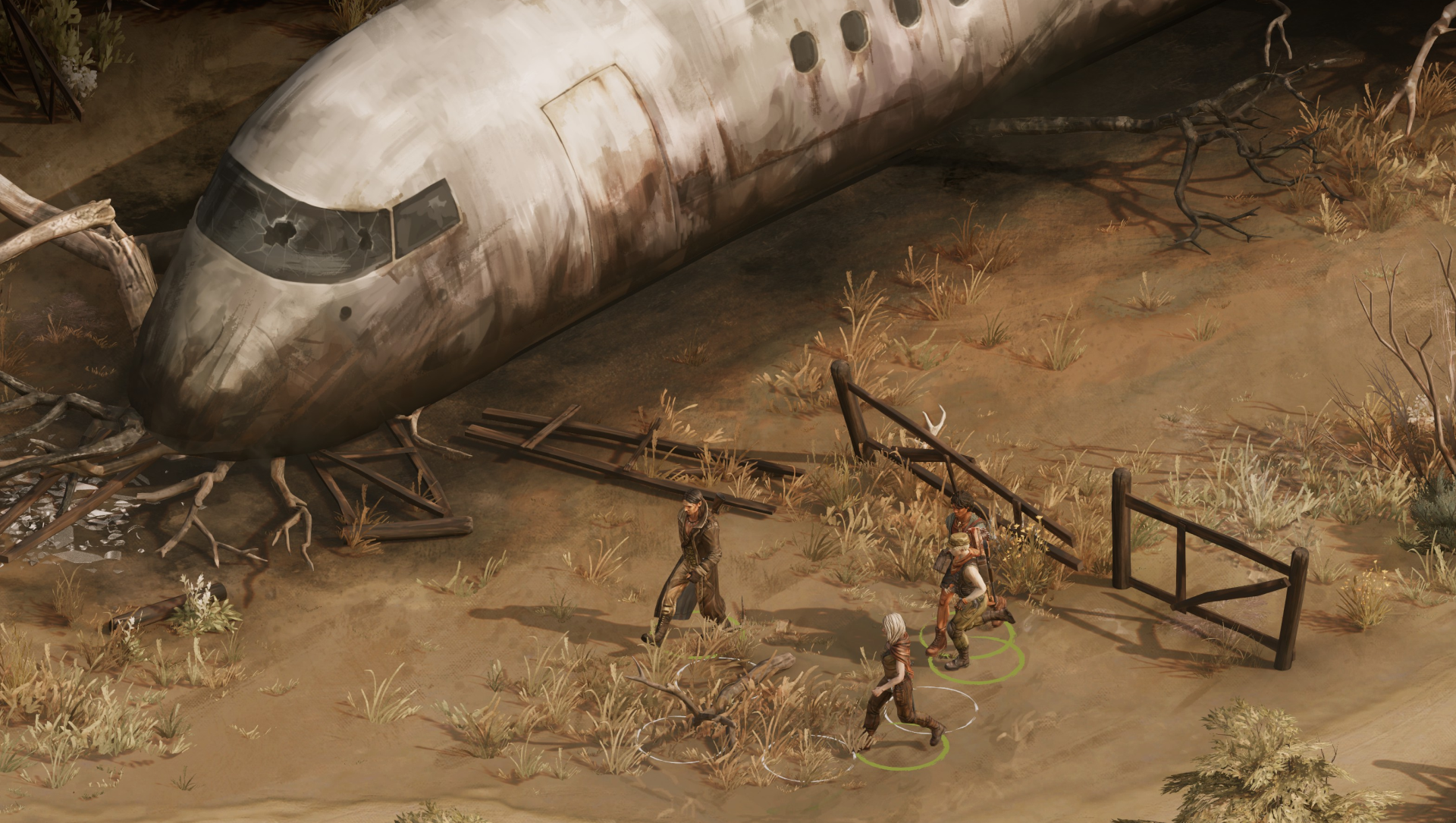Our Verdict
There's half of an amazing game in Broken Roads. Trouble is you have to play the other half.
PC Gamer's got your back
What is it? Bite-sized post-apocalyptic CRPG with big ideas and bigger problems
Release date April 10, 2024
Developer Drop Bear Bytes
Publisher Versus Evil
Reviewed on AMD Ryzen 5 3600, Nvidia 2080 Super, 32GB RAM
Steam Deck TBA
Link Official site
The Kalgoorlie Silvers, the city's militarised law enforcement caste, have received a tip. Some rabble-rousers are plotting unrest in a nearby apartment, and the authorities have ordered a raid to take them down. The plan is to bust down the door and secure the suspects by force, and while they don't want to kill everyone, they expect two or three bodies at the least. Having been temporarily assigned to the squad, I propose a radical alternative. How about—and just hear me out on this—we try talking to them first?
Squad leader Irma Wakefield arches an eyebrow: "convince me" she says.
I start off by appealing to her humanity. As officers of the law, we have a duty to protect people if possible, and surely that includes the people on the other side of the door. This is dismissed as bleeding-heart liberal nonsense, so I try a more utilitarian approach. How reliable is the information we've received? Do we know exactly what these supposed rebels are planning, or if they're even planning anything at all? Does this raid ultimately serve the greater good?
Wakefield says the orders came from the top, and she isn't predisposed to questioning them. I respond to this with a sprinkling of Machiavellianism. Surely, by investigating the situation thoroughly, you demonstrate your aptitude for the job, and you cannot possibly be blamed for doing your job properly. You might even be rewarded for it.
That gets through, and Wakefield lets me speak to the suspects through the door. But I've only got three questions before the door gets busted down, so I'm going to have to come up with a pretty convincing argument.
This is what Broken Roads is like at its best, a sharply written, intellectual adventure where your approach to dialogue and problem solving is drawn from philosophical concepts. But I must confess to a spot of Machiavellianism myself. I chose the path of dialogue not out of a fundamental respect for humanity, or to serve the greater good. I chose it to avoid Broken Roads at its worst—a barebones post-apocalyptic RPG with limited character progression, buggy quests, and tedious combat. Drop Bear Bytes' road trip through a shattered Australia might have a knack for pondering the big questions. But when it comes to doing the basics, it can be pretty bloody hopeless.
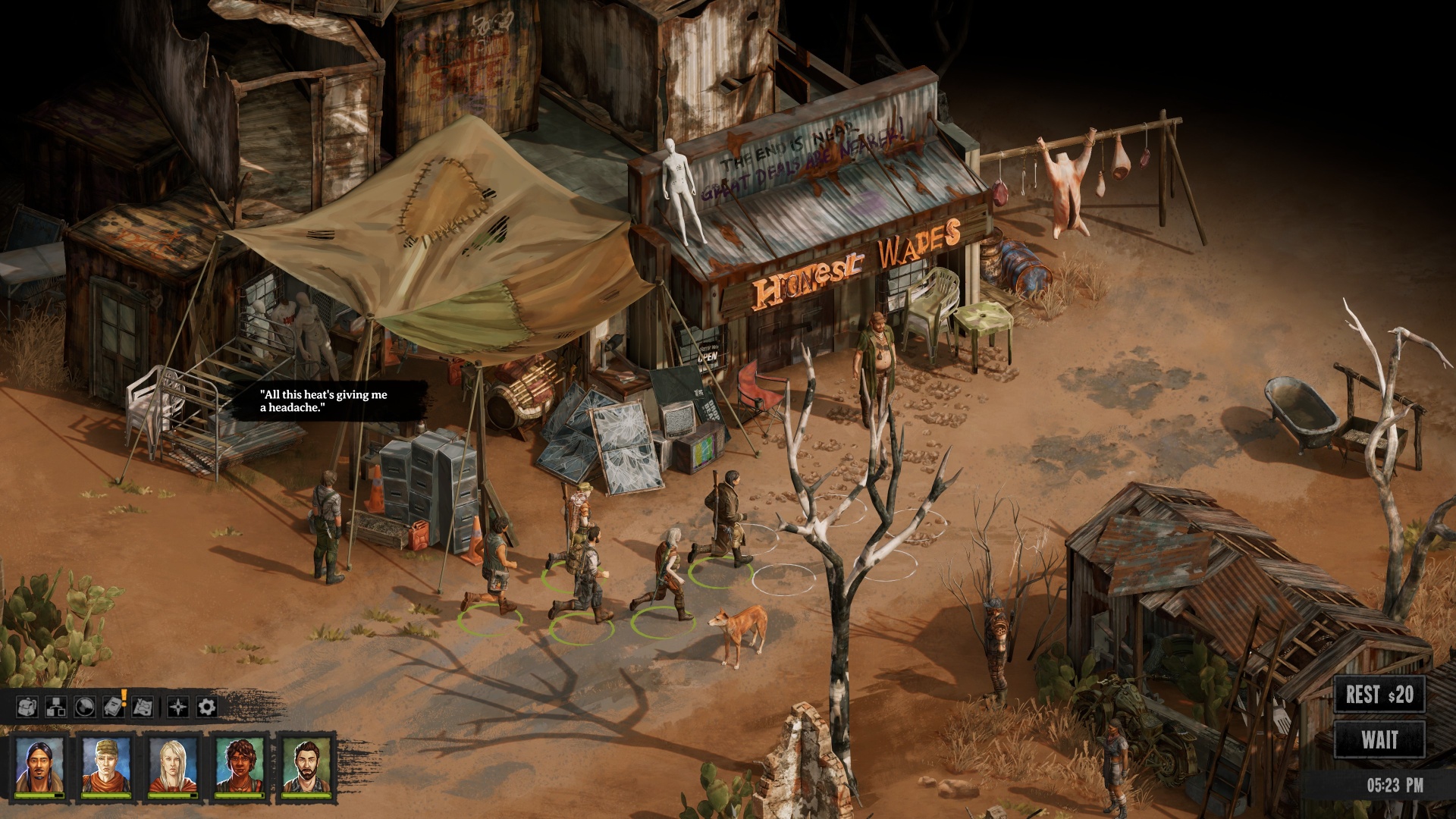
Where you start in Broken Roads depends on what background you pick for your character. I selected the trading background Barter Crew, escorting a trading convoy out of a little village called Kokeby. But Hired Guns and Surveyors enter the game at a fortified enclosure called Bally Bally Hall. Whichever origin you choose, all roads eventually lead to a small town called Bookton, which is sprung upon by raiders from the aforementioned Kalgoorlie. As you flee from the flames and the gunfire, you and the remaining survivors are left with two questions. Why did Kalgoorlie attack, and how can we get into the city to find out?
You spend much of the game trying to answer these two questions as you explore what remains of civilisation in the Australian outback. And exploring is one of the two things that I enjoy most about Broken Roads. Although it's by no means a huge game (a point we'll return to later), Drop Bear Bytes ekes an impressive amount of variety out of its setting, and every place you visit is rich in visual detail and character. These include a subterranean cave network from which an aboriginal family of traders conduct their business, an ecological commune who debate the questions of life, the universe and everything from their lofty perch in a converted grain silo, and a walled community of scientists who keep unwanted visitors out with a device that melts brains.
It's a colourful world filled with colourful people, which leads us to Broken Roads' other strength, dialogue. The game is primarily narrative driven, and at a line-to-line level, the writing lives up to the task. Through naturalistic dialogue laced with Australian slang, Drop Bear Byte conjures sharply observed characters out of just a few lines. Whether you're shooting the breeze with the landlady of the Flaming Galah pub, or discussing Descartes with Mira Calder, librarian of the Lake Deborah commune, simply wandering around the game exhausting the dialogue trees is often its own reward. Even the characters who don't want to talk to you, like the thoroughly unpleasant leader of the scientist community, communicate their disdain for you in amusingly nasty ways.
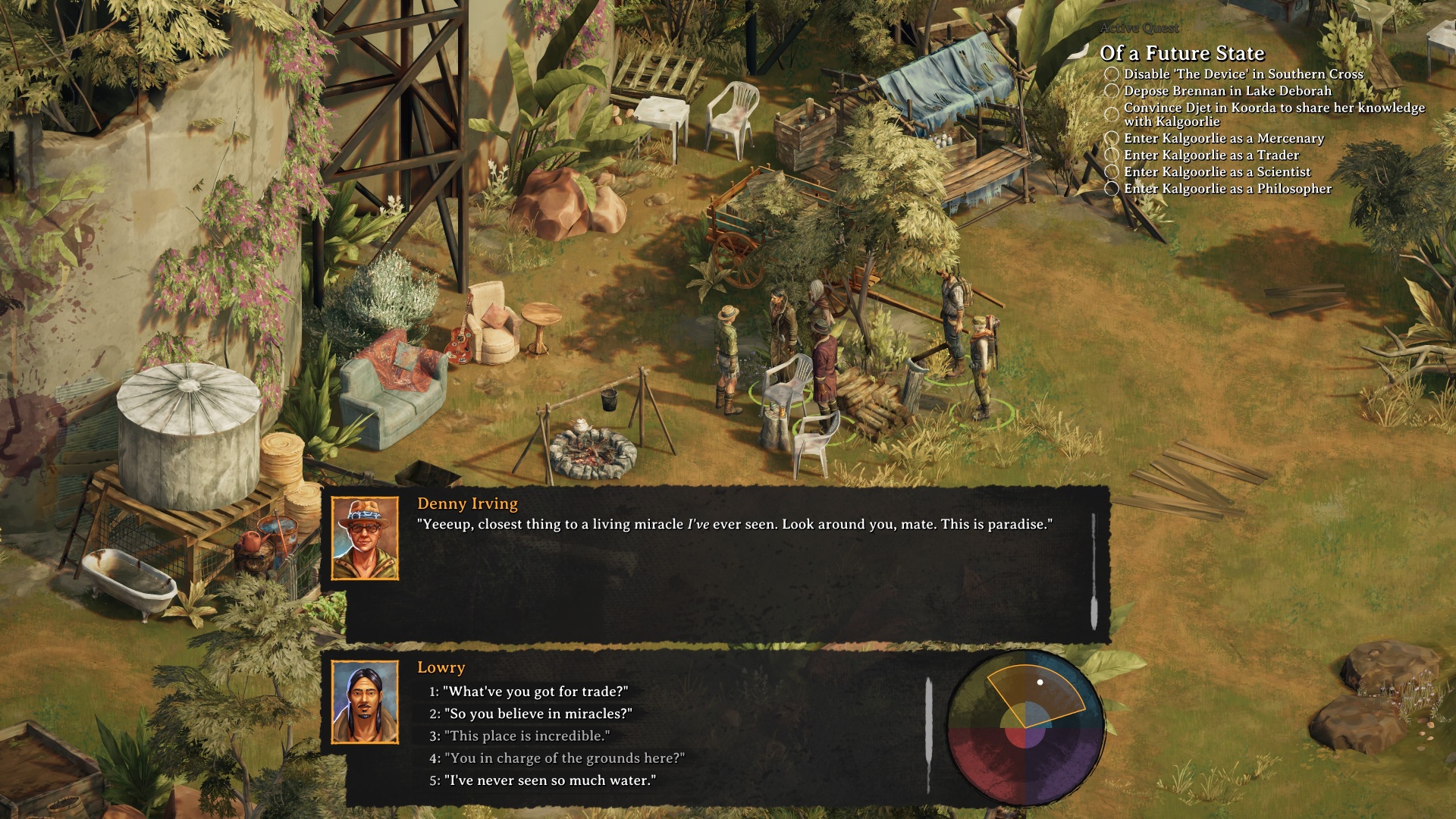
But there's more to dialogue than just telling the story. It's also where Broken Roads' most novel feature lies—the moral compass. Broken Roads doesn't frame narrative choices in terms of save the baby/eat the baby, and neither does it shoot for Geralt of Rivia grey. Instead, choices are framed around different schools of ethical thought, namely humanism, utilitarianism, Machiavellianism, and nihilism. I can't explain what each of these are in detail as it would take up the rest of the review, but very roughly, their respective outlooks on morality are 'save the baby', 'save the baby if it provides maximum happiness for all babies', 'save the baby if doing so consolidates your power over babykind' and 'save a baby? Fuck that'.
Broken Roads tries to deliver a fully fledged CRPG experience in about 20 hours, and trying to pack that kind of experience into this timeframe causes numerous problems.
Making a choice according to one of these viewpoints will push the point of the compass deeper into that perspective, offering more dialogue options from that school of thought. If you make a choice that contravenes your current philosophy, it will result in a more dramatic swing away from it. You're never completely funnelled down one path, but your choices will influence the array of future options available to you.
Now, this idea has the potential to be astoundingly pretentious. And between the quotes from philosophers on the loading screens, and the quests named after different philosophical texts and concepts, Broken Roads can have the vibe of a first-year ethics student who has just discovered Kant. Its biggest indulgence is a quest that revolves specifically about scavenging the wasteland for philosophy texts for Mira's library. Some of these are found with booksellers and memorabilia collectors, which is plausible enough. Others are just scattered around the wasteland. After a bloody gunfight with a bunch of Mad Max-style raiders, I discovered a copy of Machiavelli's Discourses on Livy in a dented footlocker next to a wheelie bin. It's preposterous, not least because Mad Max raiders are obviously Nietzsche fans.
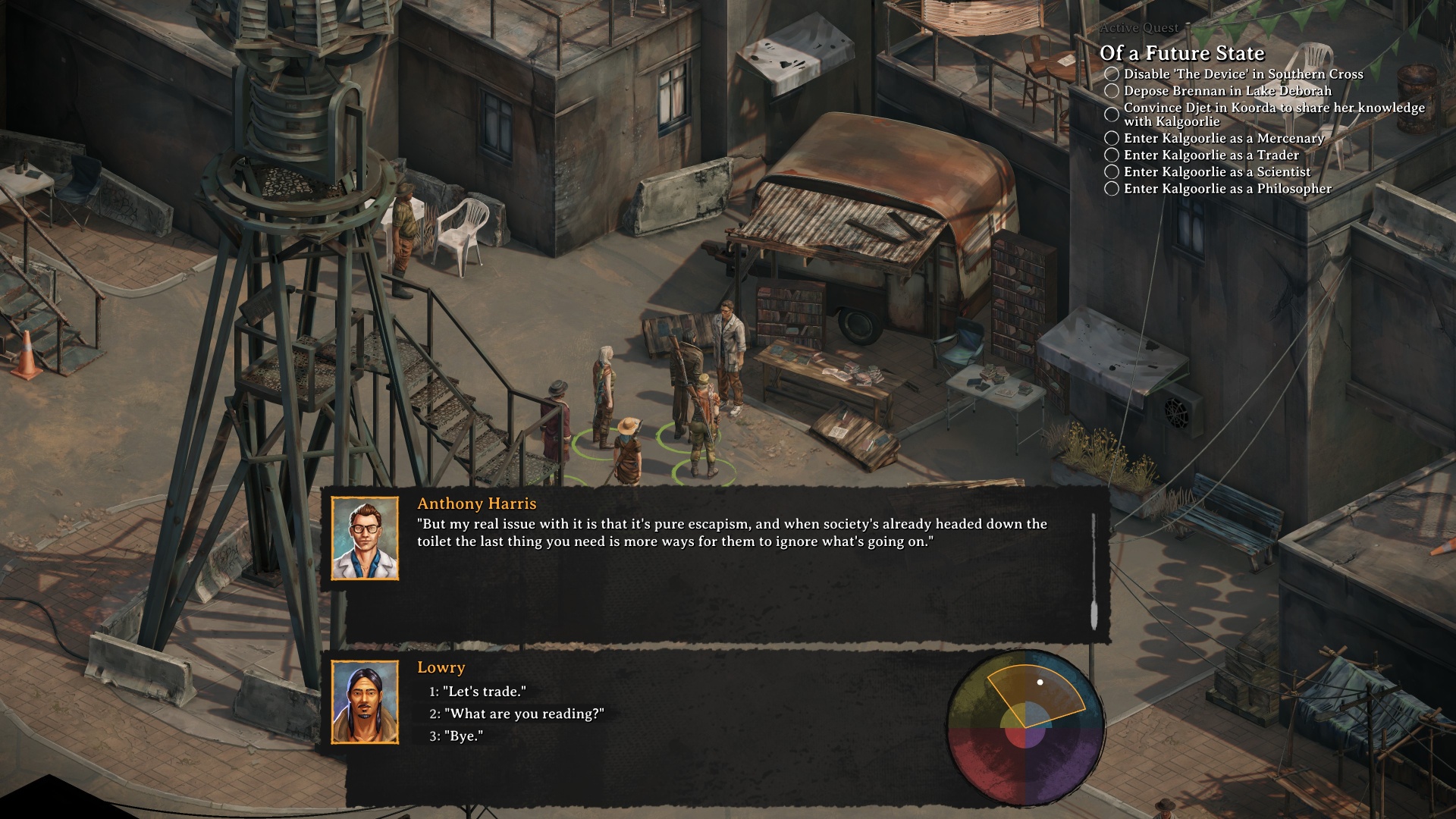
Ultimately though, I ended up wishing that the game focussed purely on its morality system and philosophical dialogue. Experimenting with these different perspectives, seeing how characters and situations respond to them, is by far when Broken Roads is most fun. It's an idea you could go full Disco Elysium with, wandering around the wasteland having philosophical debates with every character you come across. Instead, the system gets somewhat lost amid Broken Roads' broader attempt to replicate a traditional CRPG, at which it is far less successful.
Basically, Broken Roads tries to deliver a fully fledged CRPG experience in about 20 hours, and trying to pack that kind of experience into this timeframe causes numerous problems. Firstly, the story feels like it's an act short, wrapping up almost as soon as you uncover what's really going on in Kalgoorlie, and what exactly is at stake for your community and Australia at large. But it also means a lot of the game's more familiar CRPG systems are undercooked. The combat system is an incredibly basic turn-based affair, lacking the weapon, enemy or ability variety to produce interesting tactical scenarios. There's a magic system, but again, it's limited to a handful of abilities that frankly feel like an afterthought. Choosing stats and abilities is restricted only to your avatar, while your party levels up automatically. There just isn't enough space for the game to give you the sense of progression an RPG needs.
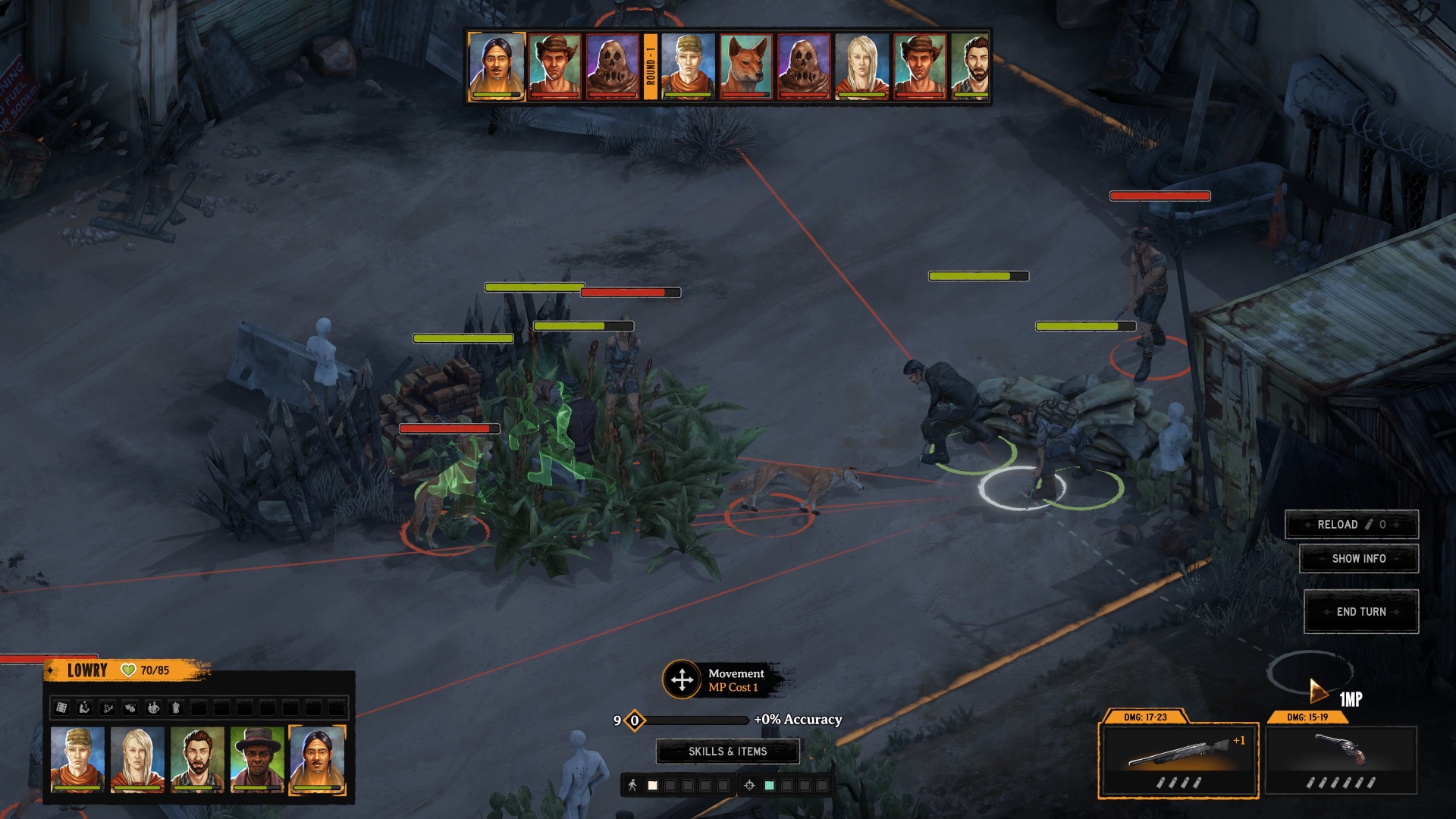
On top of this, there are frequent intervals at which Broken Roads is, well, broken. The combat, for example, doesn't factor in that characters and objects might overlap, making it difficult and sometimes impossible to select targets. I also encountered numerous issues with quests not resolving properly, failing to mark off objectives, or not providing the dialogue options needed to progress. One quest included the option to pay a prisoner's bail to spring them from jail. But when I went to the Governor's office to pay said ransom, the only thing I could say to her was "Bye". Another time, I was warned that I shouldn't ask about a particularly nasty character in Kalgoorlie as they might come looking for me. The second I did ask, said character appeared as if in a puff of smoke, and the game teleported me to a different part of the map for a combat encounter with them.
I like a lot about Broken Roads. I like its style. I like its tone. I like its attempt to do something different with morality in RPGs. It's clearly a game made with vision and affection, and aspires to be more than a Fallout knockoff. Unfortunately, that doesn't change the fact that it often feels half-finished. Mechanically, it fails to give many systems the room they need to breathe, its questing is beset by bugs, and the story rushes to a climax that doesn't really satisfy.
There's half of an amazing game in Broken Roads. Trouble is you have to play the other half.
Rick has been fascinated by PC gaming since he was seven years old, when he used to sneak into his dad's home office for covert sessions of Doom. He grew up on a diet of similarly unsuitable games, with favourites including Quake, Thief, Half-Life and Deus Ex. Between 2013 and 2022, Rick was games editor of Custom PC magazine and associated website bit-tech.net. But he's always kept one foot in freelance games journalism, writing for publications like Edge, Eurogamer, the Guardian and, naturally, PC Gamer. While he'll play anything that can be controlled with a keyboard and mouse, he has a particular passion for first-person shooters and immersive sims.
